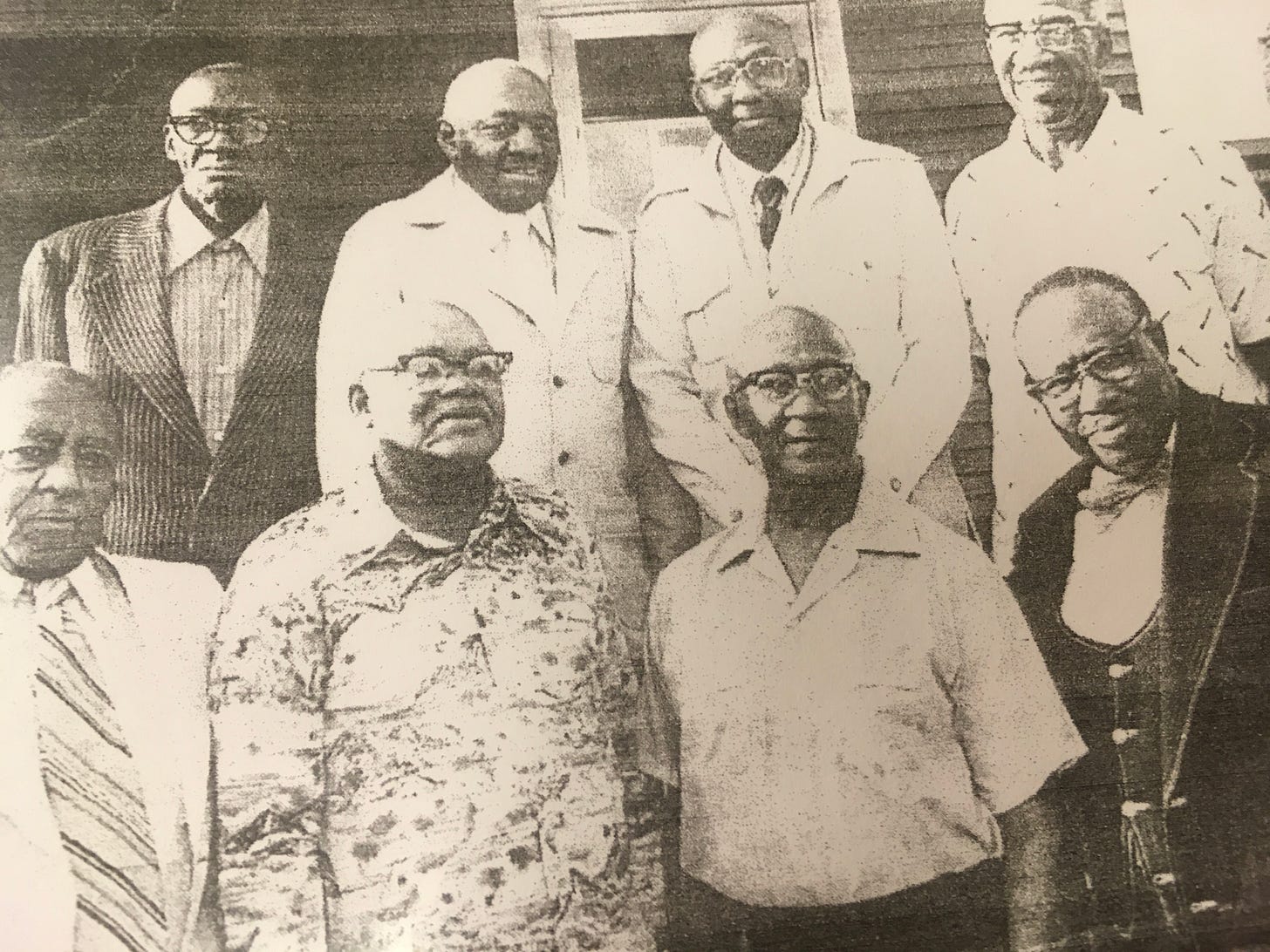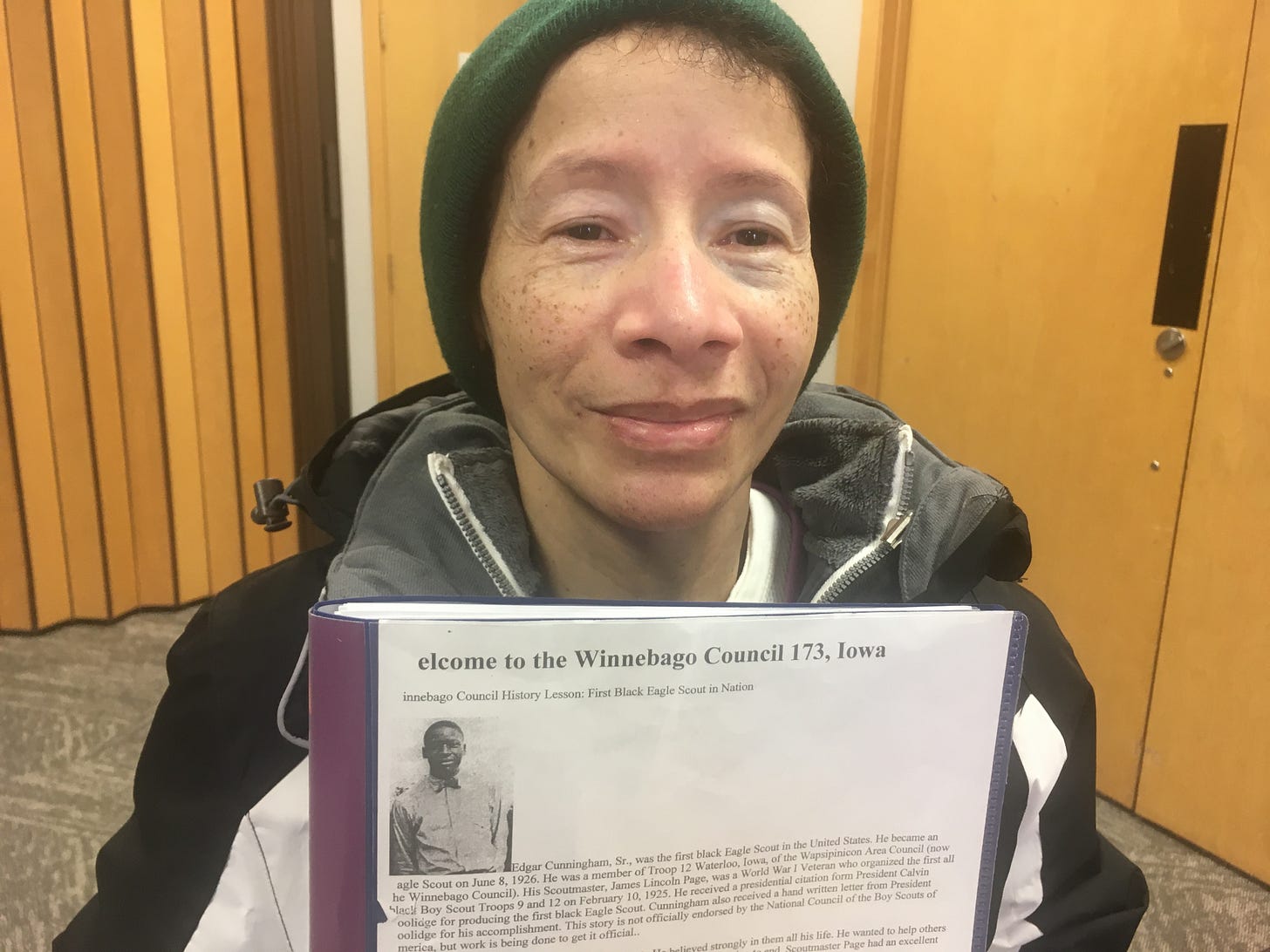On their honor, say their names
Early Black Boy Scouts from Waterloo should be memorialized, granddaughter says

The granddaughter of one of the first Black Eagle Scouts in the United States, from a troop in Waterloo, wants some kind of permanent recognition in the city for him, his fellow Scouts and Scoutmasters.
Carla McDonald, granddaughter of Edgar V. Cunningham, who received his Eagle recognition June 8, 1926, has compiled research on her grandfather and the other early Black Scouts and Scouting in the city for more than 20 years. While their achievements have been recognized periodically over the years, she would like to see some kind of permanent memorial to them somewhere in the city.
"It's been 103 years for the troop and 97 years for my grandfather," McDonald said. "This story needs to be told-not just for my grandfather, but the whole troop."
While the local Boy Scout council, the city of Waterloo and even former Gov. Tom Vilsack have presented McDonald with awards and proclamations over the years, she'd like to see some kind of plaque or memorial honoring those early Black Scouts and possibly naming them.
Those early Scouts, she said, had many descendants and need to be a tangible part of history for future generations. They are part of a larger story, she says. There were 32 all-Black Boy Scout troops nationally, and seven were from Iowa, including two troops in Waterloo which eventually consolidated. Others were formed within the Boy Scout councils based in Burlington, Davenport, Clinton and Des Moines.
Many were formed within the first 10-20 years after the Boy Scouts of America was established in 1910. It shows that Black Scouts and Scouting, and the opportunities proviced minority youth, were a key part of the overall organization’s early history, McDonald notes.
Many of the Waterloo Scouts went on to serve in ministry, labor and other fields, and influenced their offspring to do the same. McDonald’s uncle, and Edgar Cunningham’s son. Walter Cunningham, was a longtime Waterloo educator and has an elementary school on the city’s east side named for him.
The history of Scouting in Waterloo is paricularly interesting because one of its early inspirational leaders served in a heroic all-Black military unit in World War I.
Scoutmaster James Lincoln Page, the longtime maintenance engineer at the now-demolished landmark Paramount Theater in downtown Waterloo, was Edgar Cunningham's Scoutmaster. Page, a native Kentuckian who came to Waterloo after the war, served as a sergeant in the Eighth Infantry of the Illinois National Guard, which became the U.S. Army’s 370th Infantry Regiment. Dubbed "the partridges" by their French allies for their proud demeanor, and the “black devils” by the Germans for their ferocity in battle, the soldiers of the 370th acquitted themselves well in combat, particularly during the Oise-Aise offensive.
In September 1918, Page, a 28-year-old first sergeant with 10 years of experience in the Illinois Guard, apparently was assigned to a machine gun company as the 370th participated in a five-day assault on the heavily fortified German position of Mont de Signes. One of the regiment's platoons captured part of the German fortifications, turned the enemy's own guns on them and then held it for 36 hours without food or water until re-enforcements arrived.

One-fifth of Page's comrades in the 370th were killed or wounded in combat. In one instance, a single German artillery shell killed or wounded 80 soldiers of the 370th as they stood in a mess line, on Nov. 3, just eight days before the war was to come to an end.
A Victory Memorial to the Black soldiers of the Eight Illinois National Guard who served in the 370th was erected in the Bronzeville neighborhood on the south side of Chicago in 1927, and was rededicated in 2019.
James Lincoln Page died in 1986 at age 96.
For many years, McDonald believed, based on her grandfather's own assertions, that he was the first African-American Eagle Scout in the United States. However early national Scouting records did not track the race of Eagle award recipients. In more recent years, documentation of other, earlier Black Eagle Scouts were discovered in the states of Missouri and New York.
Nonetheless, McDonald says her grandfather and Waterloo Scout troops are an early and seldom told part of the local and overall Scouting history and need to be preserved.
According to her research, with records from Waterloo’s Antioch Baptist Church and Payne AME Church -- Waterloo's African-American "mother churches" -- McDonald confirmed their Sunday schools joined to form BSA Troop 12 in 1920.
James E. Mills was the Scoutmaster for Antioch and the initial 17 members of the troop were David Bell, Willie Brown, Norman Smith, Johnnie Person, Wingo Bingaman, Dudley Porter, Levere Erwing, Samuel, Rodger, Jake Murfy, Norman Mable, Andrew Irving, Herbert Mason, Setorious Dye, James Torpley, Mack Arthur and Walter Owens.
James Lincoln Page served as the AME Scoutmaster. McDonald lists the original members as brothers Robert, Percy and Bishop Burt; Harry Crockett; Edgar Cunningham; Edward Jones; Russell Lasley; Frank Lee; Remus Owens; Clay Owens; Willie Pugh; Layell Farney; Russell Bill; Rudolph Bill; Charles Taylor; Mike Morehead; Cleophus Bryant; Hars Love; Leonard Price; Leonard Sweat; Willie Washington; Span Oliver; Henry Wortham; Augustus Anderson; Vivret Norman; Claude Hoosman; Walter Pearson; and Lark Anderson.
They all took the Scout oath that begins, “On my honor, I will do my duty, to do my best, for God and country…”
Say their names, Carla McDonald says. She would like them remembered.
Iowa Writers’ Collaborative Columnists
Laura Belin: Iowa Politics with Laura Belin, Windsor Heights
Doug Burns: The Iowa Mercury, Carroll
Dave Busiek: Dave Busiek on Media, Des Moines
Art Cullen: Art Cullen’s Notebook, Storm Lake
Suzanna de Baca Dispatches from the Heartland, Huxley
Debra Engle: A Whole New World, Madison County
Julie Gammack: Julie Gammack’s Iowa Potluck, Des Moines and Okoboji
Joe Geha: Fern and Joe, Ames
Jody Gifford: Benign Inspiration, West Des Moines
Beth Hoffman: In the Dirt, Lovilla
Dana James: New Black Iowa, Des Moines
Pat Kinney: View from Cedar Valley, Waterloo
Fern Kupfer: Fern and Joe, Ames
Robert Leonard: Deep Midwest: Politics and Culture, Bussey
Tar Macias: Hola Iowa, Iowa
Kurt Meyer, Showing Up, St. Ansgar
Kyle Munson, Kyle Munson’s Main Street, Des Moines
Jane Nguyen, The Asian Iowan, West Des Moines
John Naughton: My Life, in Color, Des Moines
Chuck Offenburger: Iowa Boy Chuck Offenburger, Jefferson and Des Moines
Barry Piatt: Piatt on Politics: Behind the Curtain, Washington, D.C.
Mary Swander: Mary Swander’s Buggy Land, Kalona
Mary Swander: Mary Swander’s Emerging Voices, Kalona
Cheryl Tevis: Unfinished Business, Boone County
Ed Tibbetts: Along the Mississippi, Davenport
Teresa Zilk: Talking Good, Des Moines
To receive a weekly roundup of all Iowa Writers’ Collaborative columnists, sign up here (free): ROUNDUP COLUMN
We are proud to have an alliance with Iowa Capital Dispatch.





